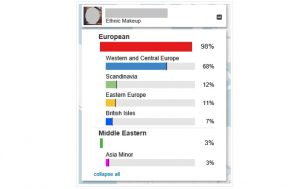Table of Contents
Genealogy research is simply a breakdown of your family from a common ancestor. So, the family trees you used to complete in middle school form the basics of genealogy/family history research.
Today, genealogy is a widely embraced practice, as evidenced by the increasing number of genealogy societies and the popularity of advanced online databases like Ancestry and FamilySearch.
However, none of these dictates how you relate with known and unknown relatives.
This guide highlights five ways to leverage your genealogy research to take your relations with your relatives to the next level.
Key Takeaways
- Genealogy research uncovers many things about your relatives, creating an understanding of them and the entire family.
- You can use the genealogy report to strengthen the bond with your relatives, provided you internalize key statistics and carefully handle sensitive issues.
- Hire a professional genealogist to start your ancestry research from scratch and document all aspects of your family in a customized and presentable manner.
-
Know Yourself Through Genealogy Research

Understand your genealogy
Before you reach out to your newly discovered relative, see how you can use ancestry research to understand yourself better. Genealogy is not solely about discovering relatives and ancestors. Instead, it can help you understand your personality, discover your roots, preserve your heritage, learn from your ancestors, and, most importantly, have fun.
Your genealogy report comes with a detailed analysis of your background and cultural heritage that you can use to understand where you came from and the attributes you convey. Besides, the physical and personality traits section details talents, quirks, preferences, and other characteristics you may have inherited from your ancestors.
Understanding the traits and values passed down in your lineage can be a significant step towards having a tight grip on your emotions, perspectives, and lifestyle. Besides, having a clear understanding of your background provides answers to obvious questions about your family. It also narrows down the focus of further research.
Knowing yourself is also about knowing your immediate family. Grasping crucial details about your siblings, parents, and children is one way to test your understanding of your genealogy. How much do you know about your immediate family member’s names, dates, and traits?
Your impeccable understanding of your immediate family would be a plus when go to the next step of knowing your relatives.
RELATED:
What Your Family History Says About Your Life
-
Know Your Relatives

Meet your relatives physically and virtually
Once you’re done mastering yourself and the immediate family, you can seek to learn more about your relatives in the family tree. Of course, knowing your relatives should start with the basics (names, dates, and events). Still, you want to know what they do, their personalities, locations, interests, degree of kinship, and more.
The first step would be to document all the relatives from a common ancestor and show their links. Whether it’s your cousins, second great-grandparents, siblings, nephews, and nieces, you must know who is who and a few aspects of their genealogy.
Above all, you should understand the links each relative has between you and other relatives. Know who is your uncle, stepbrother, cousin twice removed, nephew, and more. Luckily, a genealogy report comes with most of this data, so all you may have left is to meet them in person and study their characteristics.
Not all relatives will be friendly and loving, and that’s okay. Respect their decisions around the relationship they set with you, and don’t try to change them. Their eccentricities and quirks give the family uniqueness and flavor, and you just have to love them.
Learning about their unique stories, personalities, and achievements can help you know how to effectively approach them and communicate more empathetically.
-
Identify Common Elements In Your Genealogy

DNA Test for Genealogy
Genealogy reports also help relatives discover various elements that they share, such as ancestors, surnames, traits, blood groups, and DNA. These can serve as talking points the next time you chat with your relative and a way to enhance your bond.
For example, if you share passions and hobbies, it would be a good idea to plan activities together or pursue common goals. Having a common objective is a way to better understand your relatives and enhance your relationship with them.
The common elements represent your family history and predictions about the future. However, your relationship with relatives should not be discriminatory or biased towards those with whom you share traits. Instead, it would be best to find a commonality with all your relatives to keep the familial bond intact.
RELATED:
Physical And Personality Traits That Run In Your Family
-
Know How to Handle Sensitive Matters

Ethical And Legal Considerations
A comprehensive genealogy report may highlight sensitive issues that you should handle with utmost care. Topics such as divorce, mental illness, illegitimacy, crime, abuse, adoption, etc., should be approached with care to avoid conflict, embarrassment, and discomfort among family members.
While some of these issues are mostly avoided, they shouldn’t be hidden or denied, but instead accepted and regarded as reality and complexity of your family history. It’s also worth appreciating the circumstances and context influencing the ancestor’s actions and choices.
If you must inquire, be empathetic when trying to understand your relatives’ feelings and perspectives about any sensitive issue, and be ready to offer compassion and support when needed.
Below are the guidelines you should apply for sensitive issues uncovered by genealogy;
- Understand The Context: Study the historical context and circumstances surrounding the issue and know how best to address it with concerned parties.
- Take Cue: Find out how other people, such as other relatives, the community, or ancestors responded to the issue and the direction it has taken so far.
- Keep it Confidential: Keep the issue private by using privacy controls on online sites or anonymizing the details if stored in public records.
- Obtain Consent: If you must discuss or share the issue with other parties, you must seek permission from your relatives.
- Be Respectful: Ask questions respectfully, especially when interviewing your elders, and avoid personal questions that would appear disrespectful and invading their personal boundaries.
-
Strengthen Your Bond Through Genealogy Research

Socializing and Networking
While knowing yourself, your relatives, and handling sensitive issues may strengthen the bond, you need to be hands-on for it to work. This means gathering your relatives and creating opportunities to communicate, interact, and celebrate your family bond.
One important activity is frequent family gatherings. Luckily, with advanced technology, it is now possible to hold regular online meetings and perhaps at least one physical gathering during the holiday season.
Most importantly, the meetings and gatherings should be brief, well-organized, and have a common objective. Some of the fun activities you can incorporate in the meetings and reunions include;
- Celebrating your family heritage and traditions, such as your ancestors’ favorite art, music, foods, languages, and customs.
- Sharing memories about your family, such as old photos and stories, to see if your relatives remember them.
- Discovering fun facts about yourself and other relatives, such as the origin or meaning of their names and the events of the year you were born.
- Visiting relatives’ gravestones physically or virtually as a way to respect your heritage and your ancestors.
- Playing a family trivia game to test relatives’ understanding of names and events related to your genealogy.
- Conducting a competition for the best family tree template from each of your relative’s nuclear family.
- Tracing famous people in your family tree using online tools such as famouskin.com.
Ideas to create strong bonds with your relatives are endless, and you can create your own based on your family’s uniqueness.
READ MORE: Reliability of Famous Kin’s Work
How To Create an Accurate Genealogy Report

Cultural Ethnicity Calculator
The steps highlighted in this guide will only work when you have an accurate genealogy report that reflects the actual image of your family history. The report must also be comprehensive, showing not only the names, dates, and events but also certified cultural ethnicity estimates, inherited traits, etc.
Luckily, at Record Click, we offer comprehensive genealogy reporting at budget-friendly prices. What’s more? We offer free consultation to take you through the process based on your preferences, objectivism, and unique background,
Talk to us today about your genealogy research plans and how to use them to bring your relatives closer.







